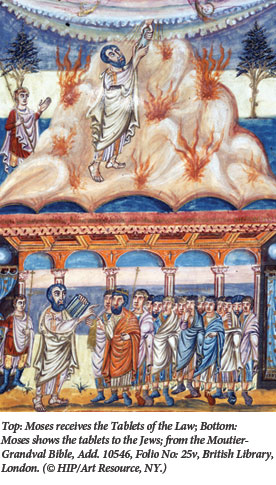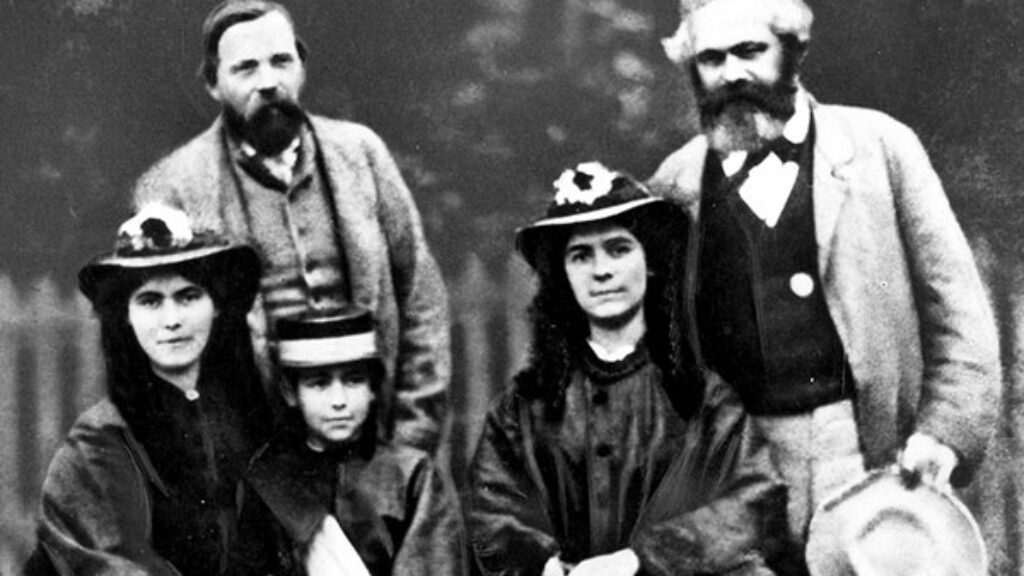Where Wisdom Begins
During the charmed years between the end of the Cold War and the onset of the War on Terror, a great many political scientists believed that as citizens and states marched into modern times they would shed one religious atavism after another until the secular, freedom-loving nations of the world came to trade with each other in perpetual peace. Few sober thinkers still believe this. “It is by a sort of intellectual aberration,” Tocqueville writes, “and in a way, by doing moral violence to their own nature, that men detach themselves from religious beliefs; an invincible inclination draws them back. Incredulity is an accident; faith is the only permanent state of mankind.”

But the religion that has returned to our public debates has been coarsened by an unconscious alliance between the New Atheists and their literalist counterparts. When the New Atheists read Genesis, they are scandalized that so many people still believe in myths from the Bronze Age. But the real scandal is that biblical literalists have rushed to defend scripture by accepting the categories and conceptions of their opponents. God either did or did not create the world in six days. There either is the creation of Genesis or there is an ongoing contest of adaption and survival without inherent moral meaning. Both the New Atheists and biblical literalists agree on these alternatives and, in so agreeing, are united in their opposition to traditional modes of monotheistic theology. Such thinking does not attend to the conceptual power of Augustine or the exegetical subtlety of Rashi, and it cannot comprehend the traditional forms of religious life passed on as an inheritance from father to son since Abraham passed monotheism to Isaac.
Enter Alain de Botton’s Religion for Atheists: A Non-believer’s Guide to the Uses of Religion, which begins with this extraordinary sentence. “The most boring and unproductive question one can ask of any religion is whether or not it is true—in terms of being handed down from heaven to the sound of trumpets and supernaturally governed by prophets and celestial beings.” De Botton, a Swiss essayist and intellectual entrepreneur living in London, “hopes to rescue some of what is beautiful, touching, and wise from all that no longer seems true.” The descendant of Abraham de Boton, a 16th-century Talmudist and author of the classic Sephardic commentary on Maimonides’ Mishneh Torah, de Botton responds to the atheist-literalist debates of our day not from the perspective of traditional religion but as Plato responded to the Presocratics and as Levinas responded to Heidegger: the good is higher than the truth.
The premise of Religion for Atheists is that religions were
invented to serve two central needs which continue to this day and which secular society has not been able to solve with any particular skill: the need to live together in communities in harmony, despite our deeply rooted selfish and violent impulses. And second, the need to cope with terrifying degrees of pain which arise from our vulnerability to professional failure, to troubled relationships, to the death of loved ones and to our decay and demise.
Although he examines Christian, Jewish, and Buddhist practices, de Botton does not interpret, and certainly does not endorse these traditions. For “they have their own apologists.” Instead, de Botton writes for atheists like himself who have overlooked “how many aspects of the faiths remain relevant even after their central tenets have been dismissed.” Secularism itself is not wrong, but “we have too often secularized badly—inasmuch as, in the course of ridding ourselves of unfeasible ideas, we have unnecessarily surrendered some of the most useful and attractive parts of the faiths.” Unlike secular institutions, religions have succeeded in combining theories about ethics and metaphysics with a practical involvement in education, fashion, politics, travel, hostelry, initiation ceremonies, publishing, art, and architecture—a range of interests that puts to shame the scope of the achievements of even the greatest and most influential secular movements and individuals in history.
Rather than denigrate religions, atheists should steal from them.
In chapters on community, kindness, education, tenderness, pessimism, perspective, art, architecture, and institutions, de Botton critically analyzes shortcomings of secular society, explains how religions have avoided those shortcomings, and suggests a secular adaptation of the religious strategy. The chapter on community showcases his approach. For de Botton as for Tocqueville, our problem is loneliness and alienation:
Whereas the Bedouin whose tent surveys a hundred kilometers of desolate sand has the psychological wherewithal to offer each stranger a warm welcome, his urban contemporaries . . .—in order to preserve a modicum of inner serenity—give no sign of even noticing the millions of humans who are eating, sleeping, arguing, copulating, and dying only centimeters away from them on all sides.
But religion knows of our loneliness, and although a “Catholic Mass is not, to be sure, the ideal habitat for an atheist,” even so, “the ceremony is replete with elements which subtly strengthen congregants’ bonds of affection, and which atheists would do well to study.” To begin with, Catholicism realizes the power of setting. The physical space of the church gives attendees “rare permission to lean over and say hello to a stranger without any danger of being thought predatory or insane.” Through its “enormous prestige, accrued through age, learning, and architectural grandeur” the Catholic Mass permits “our shy desire to open ourselves to someone new.”
It is now too easy to customize our lives and avoid citizens unlike ourselves, but walking into a Catholic Mass, one sees “a random sampling of souls united only by their shared commitment to certain values.” Attending a church service “breaks down the economic and status subgroups within which we normally operate, casting us into a wider sea of humanity.” Being cast into the wider sea of humanity might seem to be the opposite of communal, but de Botton’s point is that the homogeneous relationships inspired by secular values and enabled by technology allow us to blind ourselves to the naturally circumscribed community of our physical space. Though we all have digital friends around the world who are essentially like us, walking into a church forces us to confront the wider sea of humanity, even and especially in its poverty and frailty.
In one remarkable passage, de Botton writes that the Church knows “we strive to be powerful chiefly because we are afraid of . . . being stripped of dignity, being patronized, lacking friends, and having to spend our days in coarse and dispiriting surroundings.” Thomas Hobbes proposed that mankind naturally suffers these exact problems—excessive sensitivity to wounded pride, solitude, the ugliness of existence—and on account of these problems we are possessed by a “perpetual and restless desire for power after power, that ceaseth only in death.” The Catholic Church and Hobbes are not often thought to agree on much, but de Botton reminds us that they share a common diagnosis of our troubles.
Religions are simply better at helping us manage these troubles than secular society is. For instance, the liturgical design of the Catholic Mass takes our sensitivity to pride (or fear of embarrassment) and our longing to be with others (or fear of solitude) into account by “taking people into a distinct venue which ought itself to be attractive enough to evoke the enthusiasm for the notion of a group” and allowing individuals “to suspend their customary frightened egoism in favor of a joyful immersion in a collective spirit.” The Mass demonstrates “the importance of putting forward rules to direct people in their interactions with one another.” The missal, as the siddur, “compels the congregants to look up, stand, kneel, sing, pray, drink, and eat at given points.”
In perceptive interpretations of religious ceremonies, de Botton notes how they tend to preserve a note of sobriety beneath the celebration. Weddings mark “the entombment of sexual liberty and individual curiosity for the sake of children and social stability.” The custom of Bar Mitzvah is designed “to assuage [the] inner tensions” that parents feel as they both welcome the maturation of their child while harboring “complex regrets that the nurturing period which began with their son’s birth is drawing to a close and—especially in the case of the father—that they will soon have to grapple with their own decline.” Though de Botton believes that religions are wise in not expecting us to deal with such matters on our own, he is careful to warn against the temptation to fetishize the community.
Religions understand that to belong to a community is both very desirable and not very easy. In this respect, they are greatly more sophisticated than those secular political theorists who write lyrically about the loss of a sense of community, while refusing to acknowledge the inherently dark aspects of social life.
Throughout Religion for Atheists, there are photographs and architectural renderings, some with aphoristic descriptions that illustrate a religious insight. These images help de Botton describe the personal and social benefits of religious life exquisitely, with the effect of chastening the materialist and solipsistic excesses of secular liberalism. Liberals yearn for liberty, but de Botton contends that
A lack of freedom is no longer, in most developed societies, the problem. Our downfall lies in our inability to make the most of the freedom that our ancestors painfully secured for us over three centuries. We have grown sick from being left to do as we please without sufficient wisdom to exploit our liberty.
Now that we are free we are left to cast about without knowing where to go; that is the great problem for which religions are, if not answers, then social resources. We need patterns, forms, rituals, and habits to equip our souls for moral and humane action. We need these things because, though our reason may tell us what is right, we undermine our own resolutions to live with integrity. On the basis of this psychological truth, that each of us is at war with ourselves, atheists should appropriate religion’s strategy of finding consistent and even structural ways to fortify our better selves. “We continue to need exhortations to be sympathetic and just, even if we do not believe that there is a God who has a hand in wishing to make us so,” de Botton writes. Religion is the most impressive library of strategies for the delivery of the very wisdom we need to avoid becoming enslaved to our worst selves in the pursuit of ever more freedom.
In attempting to marshal the resources of religious life for utilitarian and public purposes, de Botton stands at the end of a long and distinguished line. Civil religion is at the core of the republican visions of Machiavelli and Rousseau and was central in the debates of the American framers. Like the theorists of civil religion before him, de Botton’s work occupies an intermediary moral position. On the one hand, though de Botton does not specify the content of morality, he does insist that we have public and private moral needs. But in jettisoning God, de Botton runs into the philosophical challenge that must be posed to all the philosophers of civil religion. How does the atheist looking to adapt religious insights decide which religious insights to adapt?
De Botton draws from Judaism, Christianity, and Buddhism, each presenting different and, at times, divergent ethical visions. On what basis can the atheist arbitrate between these competing traditions? Indeed, de Botton’s work invites Nietzsche’s great challenge: If revelation is untrue, if God is the projection of a wounded animal or a willful founder, if morality is freely chosen and not commanded, then why is kindness better than cruelty, or good better than evil? What is the value of values? From this critical perspective, Religion For Atheists can encourage us to have nice ethics and fulfilling lives. But are nice ethics sustainable if they are arbitrary? Is self-fulfillment all there is?
I can hazard a guess as to what de Botton’s response might be. Suffering cultures and souls need triage, not treatise. Do as Rome did. Appropriate whatever is of value from wherever you find it, building eclectically and putting everything beautiful and good into a central system that can be transmitted, if not by the civilization of empire, then by apostolic succession.
Religion for Atheists will frustrate orthodox believers who will be offended at de Botton’s smorgasbord approach to extracting religious practices from whole religions, and it will frustrate orthodox atheists who believe each individual truly is a rationally autonomous sovereign. But, in this hour, when religion has returned to public life, de Botton challenges religious people to think critically about how they can improve rather than accommodate secular liberalism, and he challenges atheists to retain the wisdom, beauty, and goodness of religious life.
Suggested Reading

A Lone Soldier
Every year, when Yom HaZikaron, Israel’s memorial day, rolls around, the author thinks of an idealistic college student named Alex Singer who became a lone soldier in the IDF.
Category Error
What is lost when the books of the Hebrew Bible are read as philosophy?
Ordinary Memory
“I wanted to write an integrated history,” Saul Friedländer told a magazine in 2007, in an interview marking the long-awaited concluding installment of his Holocaust study Nazi Germany and the Jews. By “integrated history,” Friedländer meant one in which the designs of genocidal perpetrators were fused with the personal testimony of the victims. “Business-as-usual history flattens the interpretation of mass…

Marx and the Jewish Fingerprint Question
Are there hints about Marx’s thoughts on Judaism in his writing, and if so, what do they say?
Comments
You must log in to comment Log In